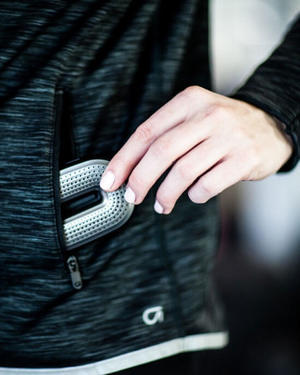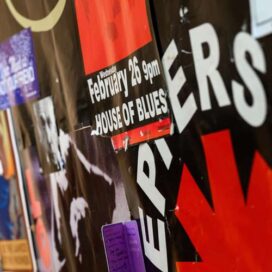Resonado: Sounding a new resonance in the speaker industry
Published: April 5, 2018 / Author: Sarah McCafferty
We are currently living in an age of substantial technological developments. Televisions, phones, and computers continually get sleeker and more efficient with each iteration and your average Joe will soon be able to act as a space tourist and own a car that drives itself. Yet, despite what seems like remarkable technological progress all around us, some technologies have advanced only incrementally over the years. Take audio speakers for example. They have largely been confined to their traditional conical structure, giving us good quality sound but in a bulky package. Resonado, a student-led startup out of the University of Notre Dame, is seeking to change this.
 Resonado’s Mini-O product
Resonado’s Mini-O product
Resonado uses a new, unique technology called Flat Magnetic Speaker technology (FMS). FMS uses flat magnets instead of the traditional cylindrical ones. These small and lightweight magnets allow for a 30 percent to 70 percent size and weight reduction in speakers. Adoption of this technology has allowed Resonado to sell a smaller, lighter, more portable, and more efficient speaker: the Mini-O. This product is smaller than the iPhone but has sound output about three times louder. Resonado claims that the Mini-O is the smallest and lightest Bluetooth speaker on the market.
In addition to the Mini-O, Resonado also sells the Bluepot, a device that allows users the ability to both charge a phone up to eight times as well as blast music out of its speakers, which, like the Mini-O, are also based on FMS technology.
Resonado adopted a particular type of FMS technology developed in South Korea, a nation where FMS is already making a significant splash. Notre Dame junior Brian Cho, a finance major at the Mendoza College of Business, one of the four founders of Resonado, interned at a Korean company called HMLink the last two summers. HMLink holds a patent in the FMS space. While there, Cho saw an opportunity to use HMLink’s technology in the United States. With their permission, he worked with that company to introduce the Mini-O to North America. “I worked with several former LG engineers on a project with this technology and simply loved the idea,” said Cho.
When Cho returned to Notre Dame, he banded together with fellow Mendoza students Peter Moeckel, Kunwoo Park and Erikc Pérez-Pérez to form the company. They began their journey with a Kickstarter campaign, an online platform designed to facilitate global crowdfunding. After failing to reach their initial financial goal, the team turned to the IDEA Center at Notre Dame for help. The first staff member they spoke with was Karen Slaggert, director of student entrepreneurship.
“From our first meeting with her until now, Karen has been extremely helpful to us,” the team noted. “She also connected us to Mitchell Kokko, a student intern, who has been instrumental in guiding us down a more successful path.”
After meeting and consulting with Kokko, the team launched a sleeker, more targeted second Kickstarter campaign. This campaign successfully raised $15,000, 150 percent of their original goal. “We were able to get our customers their speakers in time for Christmas, which was a great feeling,” said Moeckel.
In November, the team pitched their idea to a team from the IDEA Center for development funding and was awarded $1,500. Not long after that, Kokko introduced them to Elevate Ventures, a venture capital company based out of Indianapolis that helps startup companies in Indiana. After pitching to Elevate, the company was awarded an additional $25,000 in funding.
Due to these investments, the team has quickly grown from the initial four to eight. “We are looking to expand even more now,” said Pérez-Pérez. This expansion has also led Resonado to become the first student-run company to rent space in the IDEA Center’s new building, Quinn Hall. In addition, the team is moving towards a strategy of working with the larger speaker companies in hopes of selling their products to a larger number of consumers, add additional products, and start a brand ambassador program to help get college students excited about their products.
Originally published by at ideacenter.nd.edu on March 06, 2018.




